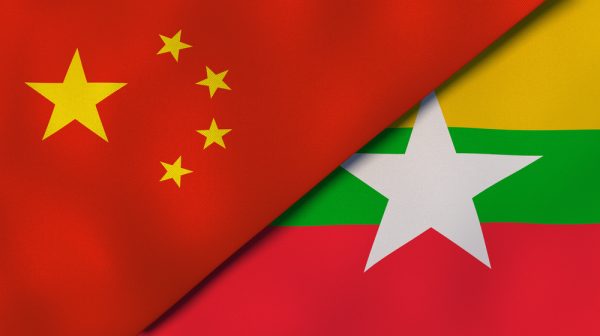Chinese President Xi Jinping (習近平) is attempting to position himself as a mediator, promoting diplomatic ties with China as a credible alternative to aligning with the US. This has potential implications for countries such as Israel, Ukraine and Taiwan. Yet in these countries, as in Myanmar, the Chinese Communist Party (CCP) is prioritizing its economic and diplomatic goals without regard for democracy or human rights.
On Friday last week, the China Daily, a media outlet associated with the CCP, reported that Myanmar’s armed ethnic groups agreed to a ceasefire brokered by China, attributing the success to Beijing’s “relentless efforts.” However, the article appears to have exaggerated the extent of the agreement. In reality, the ceasefire only involved three out of more than 20 armed ethnic groups and was limited to specific areas in Myanmar’s northern Shan state, particularly those near the Chinese border where Beijing holds significant economic interests.
This agreement is reminiscent of China’s proposed peace deal for Ukraine, as it does not advocate for the restoration of the democratically elected government led by Aung San Suu Kyi, overthrown in a 2021 coup. There are also no provisions in the agreement addressing the restoration and safeguarding of human rights. As such, ethnic armed resistance groups have continued fighting.
Beijing provides financial support and weapons to generals to ensure the stability of its investment and trade relationship. David Eubanks, founder of Free Burma Rangers, a faith-based aid group that delivers humanitarian assistance in combat zones, confirmed in an interview that China and Russia are providing the junta with heavy weapons, fighter aircraft and attack helicopters. Ironically, he also said that many of the low-quality small arms used by resistance fighters were made in China. This is typical of China’s involvement in the conflict. It backs both sides, as if to cover its bets, should the junta lose. One example is that China has extensive financial arrangements with the United Wa State Army, which has a ceasefire with the junta. However, the Wa manufacture weapons for resistance forces, fighting against the Beijing-backed government.
While Xi portrays himself as a peacemaker, Beijing shows no real concern for civilians, whose lives have been devastated by war and the junta. Sai Bee, a 32-year-old refugee from Shan state, said in an interview at a refugee camp in Thailand that China has done nothing to assist the approximately 2.3 million displaced Burmese and ethnic minorities since the coup. Instead, Thailand, not China, has provided a safe refuge for the 1.35 million people who have fled Myanmar.
“I see online, and they don’t help the villagers. Chinese police do not allow them to cross the border. They don’t do anything for the villagers; they don’t save the villagers. Chinese don’t care much about other people, other citizens. They just care about China,” Sai said, when asked how China addressed the refugee situation.
In contrast, “The Thai people help us, help the refugees, give us food. When we come to Thailand, the villagers and the Thai government come to help us, show us a better place,” Sai Bee said.
Seventy-two-year-old Sai Leng, the head of a refugee camp in Thailand, said he believes that through the combined efforts of Burmese, who joined the fight in 2021, and ethnic resistance armies, who began fighting in 1948, the people of Burma would eventually topple the junta. He expressed his desire for Myanmar to have a genuine democratic system, with ethnic states forming a republic. However, he also acknowledged that Myanmar has no other option than to maintain close relations with China.
“China is very close to us. Even if we would like a democratic system, we need to participate with China,” he said.
A general rule of Chinese investment is that China prefers stability. It tends to distrust democracy and often favors dealing with a strongman or authoritarian government. However, several countries aligning with China, such as Brazil, maintain democratic systems. China is willing to accept democracies as long as its investment and trade interests are sustained.
Therefore, it is conceivable that if a democratic government could persuade Beijing that it would remain a primary trade and investment partner, it might not hinder Myanmar’s democratic restoriation and human rights improvements.
Sai Leng articulated China’s modus operandi: “I think that China wants to play a game. They want to support the Burmese government and support the ethnic armies. They don’t mind which group is going to win, as long as they can sell.”
He added that China might be concerned about a democratic Myanmar developing closer relations with the US.
There is always a possibility China might increase its military aid to the junta, but its willingness to negotiate a ceasefire suggests that it is no longer confident in the junta’s ability to win. Thus, it is possible that Beijing might allow the junta to fall. The question then arises of whether Beijing would select one of the larger ethnic resistance armies and support them as a new strongman.
This scenario is unlikely as none of the resistance armies are large enough to occupy and control the entire country. Moreover, if such a move occurred, other armies might continue fighting, which would not serve Beijing’s interest. It appears to be in its interest to allow pro-democracy forces to emerge victorious and establish itself as the primary trade and investment partner, as it has done in the past. Even if the war ends, it seems Myanmar would be unable to leave Beijing’s orbit.

